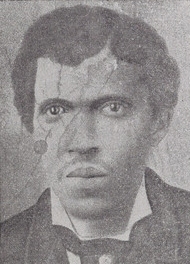Edward David Bland facts for kids
Quick facts for kids
Edward David Bland
|
|
|---|---|
 |
|
| Member of the Virginia House of Delegates from the Prince George/Surry district |
|
| In office 1879–1884 |
|
| Preceded by | Robert E. Bland |
| Succeeded by | William Faulcon |
| Personal details | |
| Born | October 1848 Dinwiddie County, Virginia, U.S. |
| Died | February 13, 1927 Prince George County, Virginia, U.S. |
| Resting place | People's Memorial Cemetery, Petersburg, Virginia |
| Nationality | American |
| Political party | Republican |
| Spouse | Nancy Jones |
| Children | 9 |
Edward David Bland (born October 1848 – died February 13, 1927) was an important American politician. He served three times in the Virginia House of Delegates, which is like a state parliament. Bland was famous for helping to bring together African-American Republicans and another group called the Readjuster Party.
Edward Bland's Early Life
Edward Bland was born into slavery, likely in Dinwiddie County, Virginia. His parents were Frederick Bland and Nancy Yates Bland. After the American Civil War, his family moved to Petersburg, Virginia. There, his father worked as a shoemaker and a preacher.
Edward learned how to make shoes from his father. He also went to a night school in Petersburg. This school was set up by people from the North for African Americans. In 1872, he married Nancy Jones. Two years later, they moved to City Point, Virginia. Edward continued his work as a shoemaker there. Edward and Nancy had nine children together.
Edward Bland's Political Journey
Edward Bland started getting involved in local politics in the 1870s. In 1879, he gave a speech at a big meeting of black Republicans. He suggested that they should work with the Readjuster Party. This party was led by William Mahone.
With the Readjusters' help, Bland was elected to the Virginia House of Delegates that same year. He won against Robert E. Bland. Edward represented Prince George and Surry Counties. While serving, he was part of committees that looked at government spending and schools. He also attended the Virginia Republican Party meeting in 1880.
He was re-elected in 1881. During this time, he worked on committees for farming, claims, and saving money. African-American Republicans helped pass laws to create a state college and a mental hospital for African Americans in Virginia. They also got more money for black public schools.
After these successes, some people who supported white supremacy tried to stop their progress. In 1883, a group called the Conservatives launched a campaign. This helped them win back control of the Virginia General Assembly. Even so, Bland was re-elected for a third term. He served on committees dealing with new laws and government offices. After his third term, he stepped down. William Faulcon, another Republican, took his seat. However, Edward Bland stayed active in local politics.
Later Years and Legacy
Edward Bland lived the rest of his life in Prince George County. He worked as a teacher, a minister, and a shoemaker. He also served as the keeper of the Jordan Point Lighthouse near City Point, Virginia. Around 1900, he moved to a farm. He passed away there on February 13, 1927, from a kidney illness. He was buried in Providence Cemetery, which is now called People's Memorial Cemetery, in Petersburg.
In 2012, Virginia state senator Jennifer McClellan introduced a special bill. This bill aimed to honor the African American men who served in the Virginia General Assembly after the Civil War. It was part of the 150th anniversary of the Emancipation Proclamation. The bill recognized Bland along with other important African-American lawmakers like Samuel P. Bolling and Daniel M. Norton.
In 1954, a housing project in Hopewell, Virginia, was named the Edward D. Bland Courts in his honor.
Edward Bland's family includes the civil rights leader Ben Jealous, who is his great-great-grandson.
See also
 | Chris Smalls |
 | Fred Hampton |
 | Ralph Abernathy |

